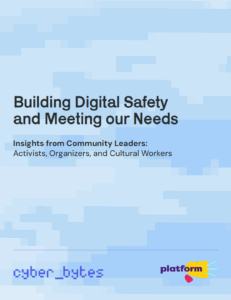Our Approach:
Empowering Women and Queer Youth Through Cybersecurity Education
We are designing a comprehensive educational framework with a national reach. Our goal is to provide women, queer individuals, and youth with the knowledge and tools to protect themselves from online threats, increase their cybersecurity awareness, and boost their confidence in navigating the digital world.
Practical steps to plan actions, protect your identity, use safer comms, and reduce surveillance and doxxing risks while organizing.
Facilitator: Riley Yesno.
How AI systems work, where bias shows up, and what safer, people-first technology can look like. Build literacy and everyday tactics.
Facilitator: Erin Peterson.
How TFGBV shows up, who it targets, and what to do. Grounded in intersectional feminist practice and community support.
Facilitator: Alexis-Carlota Cochrane.
Shift from individual burden to shared practice. Name power dynamics, map vulnerabilities, and build care-based safety plans.
Facilitator: Amira Dhalla.
Focus on Online Safety and Civic Engagement
One of our primary goals is to help women and queer youth overcome the barriers to online participation created by cybersecurity threats. By increasing their knowledge of online risks, privacy settings, and safe online behavior, we aim to foster an environment where they can engage confidently and securely in online spaces. This is crucial not just for their personal safety but also for their ability to participate in civic activities, social movements, and public discourse.
Our training will specifically address issues such as:
- Gender-Based Violence (GBV): Understanding how online platforms can be used as tools for GBV and learning strategies to avoid and combat these forms of abuse.
- Activism and Personal Safety: Learn best practices for organizing activism safely online, including using encrypted communication tools, avoiding digital surveillance, and protecting group members’ privacy. Discover how to safeguard your identity during protests, campaigns, or movements, and mitigate risks such as doxxing or harassment when facing opposition.
- Doxxing and Privacy Intrusions: Teaching women and queer youth how to safeguard their personal information and what steps to take if they become targets of doxxing or other privacy violations.
Building Digital Safety and Meeting our Needs
Insights from community leaders:
Building Digital Safety and Meeting our Needs
Key findings:
-
Confidence gap: 55% do not feel confident in their digital security knowledge.
-
Everyday hygiene: 60% rarely or never change passwords on important accounts.
-
MFA adoption: Only 35% always use multi-factor authentication.
-
Who was heard: 90% participants were Black, Indigenous, and/or racialized; over one-third identified as nonbinary/trans/genderqueer; two-thirds identified as queer/bisexual/lesbian/gay.
-
Training need: Most respondents want activist-specific, hands-on training (not one-off webinars) and sustained support.
Through this initiative, we are not just teaching cybersecurity skills; we are fostering a culture of safety, resilience, and empowerment for women and queer youth in the digital age. Together, we can create a safer internet where everyone can thrive.

Digital Protest Safety and Secure Organizing
This workshop is designed for organizers, activists, and community builders who are using digital tools to advocate for change. It offers practical guidance on how to stay safe, protect your data, and build ethical, sustainable online practices.
Facilitated by Riley Yesno

AI IRL: How You Interact with AI and How to Stay Safe
Understand how AI works, how it reinforces bias, and how we can imagine better, safer technology together. This interactive workshop is designed for anyone who want to better understand AI, its real-life impacts, and how to question the systems that shape our digital experiences.
Facilitated by Erin Peterson
Digital Resilience Through Collective Care
Digital Resilience Through Collective Care invites participants to reimagine digital safety as a practice of collective care rather than individual burden. Together, we’ll unpack the emotional and relational impacts of digital threats, explore how power and privilege shape our vulnerabilities, and share tools and strategies grounded in solidarity.
Facilitated by Amira Dhalla

Understanding & Responding to Technology-Facilitated Gender-Based Violence
Learn how TFGBV shows up, who it harms, and how we can stay safer and support each other online. Grounded in intersectional feminist frameworks, the workshop explores how gendered digital harm is shaped by systems of oppression such as racism, ableism, colonialism, and transphobia.
Facilitated by Alexis-Carlota Cochrane









